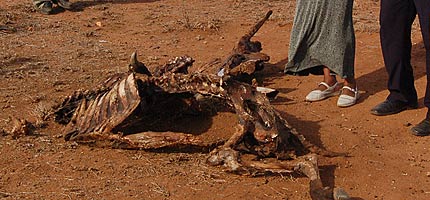© FLM/Fredrick Nzwili
[En anglais & allemand]
Kenya: Ne versez pas de larmes, de peur qu’on ne vous demande où vous avez trouvé l’eau
Lutheran Churches Urged to Protect Communities Threatened by Climate Change
Safiel Kulei’s simple statement goes to the heart of the plight of many of his neighbors hit by consecutive years of drought in Kenya.
“I had 88 cows. I sold 50. The rest died. I have nothing at the moment. I have since moved to town,” said Kulei, a farmer who is an evangelist with the Kenya Evangelical Lutheran Church (KELC).
Kulei is a member of the Maasai community inhabiting southern Kenya and neighboring northern Tanzania. The people’s lives and economy are centered on livestock especially cattle, which are accumulated as a sign of wealth, traded or sold to settle debts, and slaughtered selectively. Before the current rains began, nearly three running years of drought decimated the community’s economic mainstay and livelihoods.
“As opposed to previous years, when the clouds formed, no rains fell,” Kulei said when he welcomed participants in a Lutheran World Federation (LWF) African region consultation on climate change, food security and poverty. Delegates to the LWF conference had visited the KELC Olirium mission area in the southern district of Kajiado. “When children cried, they were told to make sure there were no tears since people may ask, ‘Where did you get the water?’” he said, emphasizing the scarcity of water.
Climate Change
Kulei’s story is similar to many others recounted at the consultation, held from 6-10 October in the Kenyan capital, Nairobi. It was attended by leaders of LWF member churches in Africa and their mission partners, and church-related development programs.
Mmeme Akpabio of the Lutheran Church of Nigeria told how 50 years ago palm oil was cultivated and produced extensively in the Akwa Ibom state.
“Increased heating and adverse atmospheric conditions are leading to less palm oil productivity,” said Akpabio. “Adverse climate change has led to problems with food sources due to harsh cultivating environments in northern Nigeria,” she explained.
The consultation heard that indiscriminate pumping of carbon dioxide and other greenhouse gases into the atmosphere by developed countries was the biggest cause of climate change.
Africa, which contributes only three percent of the gases, faces the greatest risk. The continent is less prepared for drought and floods and is already experiencing heavy rains and prolonged dry spells, leading to unreliable farming seasons, water scarcity and decreased pasture for pastoralist communities.
Food Security
The United Nations Food and Agriculture Organization (FAO) warns that climate change could lead to an increased dependency on food imports by Africa, and may reduce the continent’s agricultural output by up to an estimated 30 percent.
Sub-Saharan Africa, already the most food insecure region, is expected to be hit hardest in terms of decreasing agricultural incomes.
FAO says nearly 265 million people in Sub-Saharan Africa are suffering from chronic hunger. There are 20 million people in East Africa dependent on food assistance, warns the UN body, and this number may increase, especially among marginalized farmers, pastoralists and low-income people in urban areas.
The agency cautions that this problem was likely to be compounded by the El Niño meteorological phenomenon, which is currently bringing heavy rains to the region and will likely result in flooding, destruction of crops, livestock, infrastructure and homes.
“These changes are connected to how men and women in attempts to control the universe, are also destroying it,” explained Ms Gemma Akilimali, gender analyst from the Evangelical Lutheran Church in Tanzania. “By destroying it, [this] interrupts the natural equilibrium that governs the creation of the universe,” she told participants in the LWF consultation.
Church Intervention
“The church can protect and accompany the most vulnerable,” Isaiah Kipyegon, regional communications and advocacy coordinator for Norwegian Church Aid (NCA), Eastern Africa, told the conference. “Dealing with climate change requires urgent concerted efforts,” he said.
LWF churches are taking steps to help. Tigist Teketel, director of the Development and Social Service Commission of the Ethiopian Evangelical Church Mekane Yesus (EECMY) said the church runs 40 projects dealing with food security, environmental protection and natural resource management, water supply and sanitation.
The EECMY Armacho project in northwestern Ethiopia, developed with NCA support, enables community members to grow apples, a new product to the region. The project provides food for families and increases their income.
“Households reported they had produced apples twice a year and sold them at the local market. Each of them earned four times more than what they used to earn from other crop sales. These households have managed to buy enough and invest in animal production,” said Teketel.
Water scarcity has its greatest impact on women and the situation is worsening. Most women in Africa must travel long distances to get water for their families, said Akilimali.
The consultation called on Lutheran churches around the world to work together to tackle climate change and ensure that the voices of the vulnerable are heard. “Climate change is an ethical and moral failure because we continue to destroy creation,” the consultation concluded.

